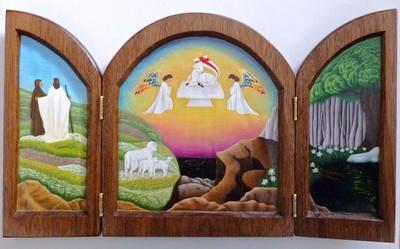
Jodi Simmons
Psalm 23
Tempera on gessoed wood
Everyone familiar with Psalm 23 has their own comfortable mental picture of the "green pastures" and "still waters" promised by the Good Shepherd, however reluctant we may be to dwell in our imaginations in "the valley of the shadow of death." In this tempera on gessoed-wood panel triptych of the much-loved Psalm, American Icon-writer Jodi Simmons uses these three visual motifs to create a luminous landscape of metaphysical mystery, where the Good Shepherd of the Hebrew Scriptures becomes Christ, the Lamb of God of the New Testament, intertwining theological (and eschatological) themes from both traditions. Working in a style that pays homage as much to the Quattrocento painters of Italy as the iconographers of Byzantium, Simmons lets her panoramic scene run continuously across the three panels, remapping this familiar biblical geography. The green pastures and still waters in Simmons' version of Psalm 23 stand on opposite sides of a great divide formed by the valley of the shadow of death, a rock-bound chasm in the middle of the central panel, ending abruptly in a pitch black sea. At this darkest point in the triptych, the painting unexpectedly opens upward into its brightest passage: a mystical, apocalyptic vision of the Exaltation of "the Lamb that was slain," recorded in Revelation 5:11-14, recalling the Adoration of the Lamb panel in the Ghent altarpiece of 15th century Flemish Master Jan van Eyck. Darkness gives way to light, death to resurrection, separation to reconciliation, and what is past to the future. The Shepherd and the wayfarer in the flowered field of the left panel might equally suggest the Risen Christ encountered on the Road to Emmaus. The mighty oak beside the still waters on the right recalls the Tree of Life by the river in the New Jerusalem "for the healing of the nations" (Revelation 22:2), the massive rock, underneath, becomes the "white stone" of Revelation 2:17 on which our new names will be written at the End of Time. (John Kohan)
